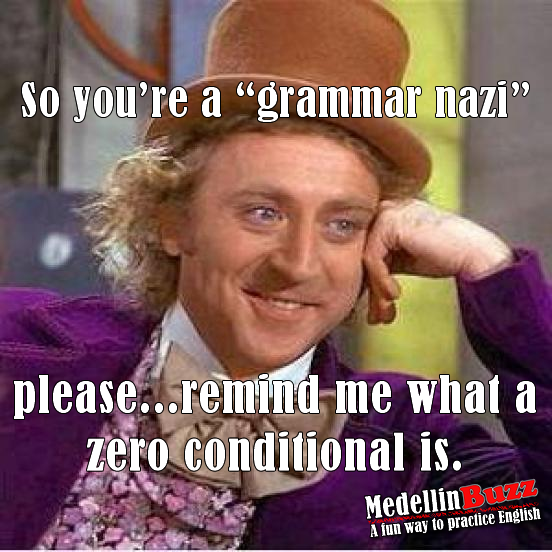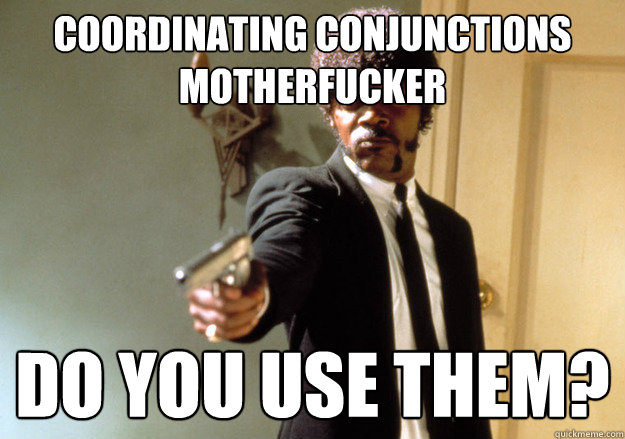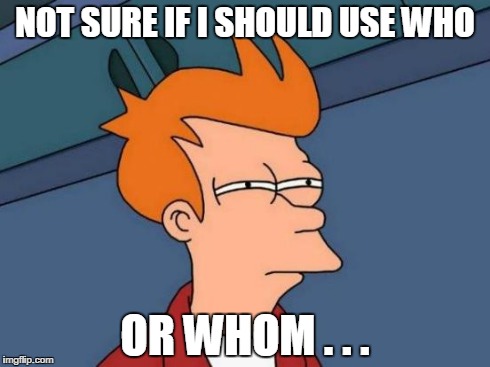
If you are a native Spanish speaker conditionals can be easily translated, therefore, easy to understand.
This lesson is intended for intermediate to advanced level English as a second language students.
When do you use a conditional phrase?
Conditionals are used to envision events in certain conditions. The conditional can be used to convey real events that always happen, imaginary events, or regrets. Conditional sentences are sometimes called ‘if’ sentences. Here are some examples:
“If I’m late, start without me.”
“If my friend continues eating like a pig, he will get fat.”
“If I had a million dollars I would buy my mother an elephant.”
“If Yepes’ goal had not been annulled, Colombian would have won.”
How do conditionals work?
There are four basic type of conditionals: Zero, First, Second, and Third. Let’s go over these conditionals in a very easy to understand way.
Zero Conditional
We use the Zero Conditional to talk about facts, routines, and exceptional situations.
Fact: “If you heat water to 100 degrees Celsius, it boils.
Routine: “If I wake up late, I have breakfast on the run.”
Exceptional situation: “In case of a fire, use the stairs not the elevator.”
Formula = If clause: (verb in simple present) + Consequence clause: (verb in simple present)
Note: The Zero conditional is not used as frequently as the other conditional forms in spoken English.
Now you try
If you _________________________________, ___________________________________________.
When I ________________________________, ___________________________________________.
My father __________________________________, if I __________________________________________.
First Conditional
The First Conditional is used to talk about conditional situations that affect the future that have a high probability (real conditional) of occurring. Since we are talking about the future we will be using “will” and/or “going to.”
“If you study hard, you will pass the test.”
Formula = If clause: (verb in simple present) + Consequence clause: (will/going to + verb in simple form)
“If you watch Titanic, you will cry.”
Note: You never use the future auxiliary in the If clause and you can also switch the position of the clauses.
Now you try:
If Mary ________________________________, she will _________________________________________.
If my mom _____________________________, she is going to ____________________________________.
When I ________________________________, I will ___________________________________________.
I will __________________________________, if you __________________________________________.
Second Conditional
The Second Conditional is used to talk about conditional situations that affect the future that have a low probability (unreal conditional) of happening. This is where we use the auxilary “would.”
“If you paid attention, you would understand.”
Formula = If clause: (verb in simple past) + Consequence clause: (would + verb in simple form)
“If you read the instructions, you would know how to use it.”
Note: You never use “would” in the If clause.
Now you try:
If Tenorio ________________________________, he would _________________________________________.
If Bethany _____________________________, she would ___________________________________________.
If my uncle _______________________________, he would _________________________________________.
I would __________________________________, if you ___________________________________________.
Third Conditional
The Third Conditional is used to talk about past events which cannot be changed. We usually use this type of conditional with regrets.
“If I had studied harder, I would have passed the exam.”
“If my girlfriend had arrived on time, we wouldn’t have missed the movie.”
Formula = If clause: (verb in past perfect) + Consequence clause (would + have + verb in past participle)
“If you had brought guaro to the party, it wouldn’t have been so boring.”
Now you try:
If we had __________________________________, we could have ___________________________________.
My girlfriend would have ________________________, if I had ______________________________________.
Superman should have __________________________, but he had ___________________________________.
I ___________________________________________, if __________________________________________.
Note: There are more ways to use conditionals. Like in Spanish you can mix conditionals depending on the context. For example: I would do it, if you would have told me earlier.
Review
- Zero conditional: If clause: (verb in simple present) + Consequence clause: (verb in simple present)
- First Conditional: If clause: (verb in simple present) + Consequence clause: (will/going to + verb in simple form)
- Second Conditional: If clause: (verb in simple past) + Consequence clause: (would + verb in simple form)
- Third Conditional: If clause: (verb in past perfect) + Consequence clause (would + have + verb in past participle)
Now let’s practice in person…if I invited you to a free conversation club event, would you come?
Come practice your English/Spanish at our Conversation Club Events: Conversation Club Event Calendar
About the writer – Andrew Macia
Hello, my name is Andrew Macia and I am the founder of the Medellin Buzz. I am an advanced level English teacher here in Medellin, and I also have a website development, and marketing company which I run from home.
My idea with the Medellin Buzz is to push those who are learning English and to integrate native speakers with non-native speakers.
I love living in Medellin and I love Colombia. I want to give back to the community and this is the best way I know how. Let’s practice English and Spanish and have a great time!






